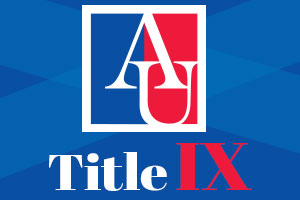Campus Safety
What's Involved with a Title IX Complaint? A Walk Through the Process at AU

Update: The office is now known as the Office of Equity and Title IX. It oversees all of AU's efforts to prevent and respond to discrimination, bias, harassment, and sexual assault, including the Title IX complaint process described in this article.
Up to a quarter of women nationally undergo a sexual assault or attempt during college. Over four percent of college students have been stalked. The statistics are appalling. But as students increasingly choose to speak out, many also have questions about what happens if an incident is reported.
What does it mean, at AU, to come forward about sexual and gender-based harassment or violence? One part of the process can involve exploring whether to file a Title IX complaint.
Title IX is a federal civil rights law that applies to institutions like AU that receive federal funding and protects people from sexual discrimination. “It’s the right to have full access to education,” explains Title IX program officer Regina Curran, “regardless of your sex or gender or something that happened because of your sex and gender.”
Curran and investigator Fariha Quasem are the team at the Title IX Office, and their job is to determine if a student’s rights have been violated in ways that can be addressed by the university.
What to Expect
The Title IX office is housed at the Office of Campus Life near a sign that reads, “You Matter.” When a student contacts the office (which can be done through an online form), the first meeting will be with Curran, a down-to-earth Oklahoman, and it’s always just a chance to talk — a conversation about what happened and what could be done by AU to address it.
If the complaint is pursued, there’s a fact-finding process that engages, separately, with each student involved. Many times, Curran notes, there’s little disagreement on the facts, but each person’s experience of the situation is different.
The investigation is led by Quasem, whose job to gather physical evidence, such as social media posts and texts, and talk to witnesses proposed by the parties involved.
“I know there won’t usually be eyewitnesses to a sexual encounter,” Quasem says, but she’ll listen to people who may know something about an event and are comfortable coming forward. There are no disciplinary consequences for conduct that a witness opens up about, such as drinking at a party; the only conduct issue being looked at is the one in the complaint.
They’re very concerned that everyone involved in the case — the complainant, the student being accused, the witnesses — are treated with fairness and respect. “At the end of the day,” Curran says, “I want everyone to feel that even if they don’t like the outcome, they understand how it was arrived at and feel they were treated fairly.”
The recent intense public discourse about sexual assault has had a marked impact on reporting at AU, including Title IX complaints, a pattern that has been seen on campuses across the country. Reports began to spike at AU in October 2017, immediately after allegations against film producer Harvey Weinstein made the news and the #MeToo movement began.
That semester, AU had also expanded the Title IX office to include an investigator, which allowed Curran, as program officer, to do more outreach and training, processes that are also associated with higher numbers of people coming forward to explore the complaint process.
Even if a complaint can’t be pursued — for instance, if the perpetrator isn’t a member of the AU community — a student still has rights under Title IX. “Sometimes, they just want to not fail a test because it happened two days after a rape,” Curran says. The office can help with that, too, by helping to arrange accommodations.
About the Team

While a Title IX complaint process is a fact-finding effort about rights violations and not a legal case, both Curran and Quasem are well-versed in the law; in fact, they trained as lawyers. For Curran, it was Hurricane Katrina that set her on her path. As a college student in Texas interning after the 2005 natural disaster, she worked with displaced people housed in FEMA trailers and not only learned about civil rights but had a glimpse of troubling situations intensified by stress, including domestic abuse.
She went to law school, but when she saw the overloaded dockets and speed at which lawyers were often forced to push through cases, she found herself drawn to applying her legal knowledge in a more one-on-one setting that also included a focus on behavioral change.
Quasem, a lifelong Marylander who went to both undergraduate and law school at the University of Maryland not far from where she grew up, still lives in Montgomery County where she enjoys walks with her husband, thoughtful conversations with friends, and evenings with books. She’s also a keen global traveler, from trips to visit relatives in Bangladesh to annual adventures abroad with girlfriends. (Last year’s trip was to England and Scotland, and she just got back from a weekend in Venice.)
The team shares the work, with Curran focusing on intake and outreach to the community, and Quasem handling the investigation. Ultimately, a finding is written that determines if policies were violated, in which case the final decision about consequences will be made by a sanctioning panel and Dean of Students. (A flow chart for the process is on the Title IX webpage.)
Sanctions come in two types: educational sanctions (such as reflections, alcohol education, and other follow-ups) and status sanctions (including warning, censure, disciplinary probation, suspension, and dismissal). Every student who is found responsible will be given a status sanction and many will be given educational sanctions.
“Most people think of the most severe cases in Title IX,” Curran notes, such as rape and assault, “but it does cover a wide array of behaviors, so we want to keep all our sanction options in mind to address the situation at hand.”
Finding Support
AU’s Title IX office is one part of a three-pronged approach – emotional support, advocacy, and civil rights-focused — that ensures AU students have resources in cases of sexual assault, rape, dating or domestic violence, sexual harassment or stalking.
“Every student who comes through that door – I never want us to be the only place they’re talking to,” Curran says.
Students seeking counseling support are encouraged to reach out to the Counseling Center.
For free and confidential victim advocacy services, or if students are unsure about contacting the Title IX Office and want to talk it through (or find someone to go with them to the Title IX Office, which is always a right), the advocates at OASIS are available to help. It’s located at the Health Promotion and Advocacy Center (HPAC).
Staff seeking accommodations or supports should contact Beth Muha, the Deputy Title IX Program Officer in Human Resources (employeerelations@american.edu).
Faculty should contact Deputy Title IX Program Office Lisa Leff at deanofacademicaffairs@american.edu.
It’s all a part of ensuring that civil rights laws work for the campus community and helping to make AU a place where everyone feels safe and supported.
